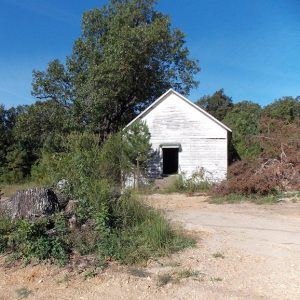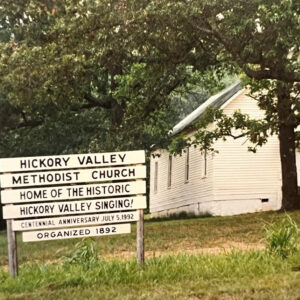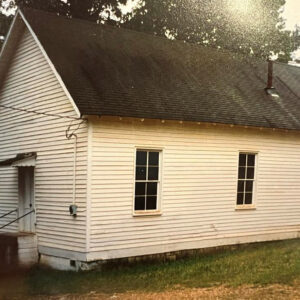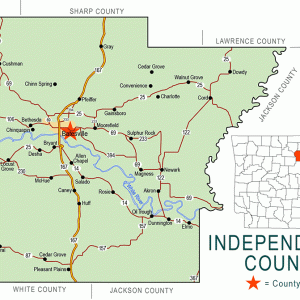calsfoundation@cals.org
Hickory Valley (Independence County)
Hickory Valley is an unincorporated community in Barren Township in Independence County. The historic Hickory Valley Methodist Church stood across Highway 167 North from the Hickory Valley Cemetery, once called the Brewer Cemetery; the old building, in a state of disrepair, burned in June 2016. Hickory Valley is three miles south of Cave City (Sharp and Independence counties) and ten miles north-northeast of Batesville (Independence County).
John W. Meacham, born in North Carolina, brought his wife and family from the Cumberland River country of Tennessee to the sparsely settled area he named Hickory Valley around 1827, building a log cabin in the woods. He operated a trading post by his cabin. His youngest son, Thornberry Anderson Meacham, born in 1831, would later construct a cotton gin across the road from the cabin. Thornberry Anderson Meacham married Mariah Elizabeth Allen in 1856. Mariah was a member of the pioneer Allen family of Independence County, and her aunt Isabella (Sibella) Allen was married to a cousin Abraham (Abram) Allen, one of the wealthiest men in the county.
Another early settler was John Worth Gray of North Carolina. Following the death of his first wife, Verlinda Robbins, and his second marriage, to Sarah Crow, Gray packed up his belongings and headed west with his family, ending up in Hickory Valley by 1850 to help promote the Methodist church there. His two sons, half-brothers Elisha Columbus Gray and the Reverend James Burrow Hines “Burr” Gray, became prominent citizens of Hickory Valley and helped build the community. Their sister Lutitia Gray married William S. Meacham, a brother to Thornberry Meacham, connecting those two pioneer families of Hickory Valley. Gray’s Chapel is named for the Gray family.
Hickory Valley had four physicians, all sons of Rev. Burr Gray: Dr. Frank Gray, who built the hospital in Batesville in 1939; Dr. Daniel Gray, who practiced in Searcy (White County); Dr. Fred Gray, who built the Gray Memorial Hospital in Little Rock (Pulaski County); and Dr. Cyrus Robert Gray, who built a hospital in Newport (Jackson County), which later became the Harris Hospital Annex.
Rev. Burr Gray was a planter and a Methodist circuit rider. A Confederate soldier, he enlisted on July 4, 1864. Gray’s company surrendered at Jacksonport (Jackson County) on June 5, 1865. Rev. Gray’s half-brother, Elisha Columbus Gray, served for the Confederacy as well, as a private in Company E, Eleventh Regiment, Arkansas Infantry.
Lutitia Gray’s first husband, William S. Meacham, died during a typhoid outbreak in 1856. A few years later, she married William L. Brewer of Hickory Valley, another pioneer of the region. In the midst of the Civil War in 1864, William’s father, Willis Brewer, was shot and killed at Gainsboro (Independence County) at Little Watson’s Store and buried there. When the family found out about his death, they exhumed his body and buried his remains at the Old Brewer Cemetery, now Hickory Valley Cemetery.
Elisha Columbus Gray was instrumental in setting up the Gray Institute near his father’s home. The institute (a.k.a. Fairfield Academy)—where Elisha Gray taught mathematics, Greek, and Latin—opened in about 1854. The institute stayed active until the 1890s. Hodge School in Hickory Valley was built following the closing of Gray’s Institute and was still active in 1936. In the 1940s, Hodge School merged with the Cave City School District.
By 1856, Hickory Valley had grown enough to justify the establishment of a post office. Thornberry Anderson Meacham was appointed the first postmaster that year, and he chose the name Hickory Valley for the official address of the community after the name of the Methodist church and the community that had sprung up around it. The name for the church, post office, and community derived from the majestic hickory trees found in the valley by the first settlers.
By 1849, a large range of manganese ore deposits had been discovered in northwestern Independence County with a spillover into Sharp, Izard, and Stone counties. This discovery came to be labeled the Batesville District, with Cushman (Independence County) at its center, and contained Hickory Valley. The mines in Hickory Valley are Paul C. Teas Phosphorus Mine, Milligan Prospect, Eliza Patterson Prospect, and the Ball Mine. A prospect is a manganese ore “dig.”
The cause of the decline of Hickory Valley, a once prosperous and promising community—as well as Hickory Valley’s offshoot, Gray (Independence County)—is unclear but may be connected to the appearance of the new town of Cave City. Cave City ended up in Sharp County when a three-mile strip of Independence County was transferred to Sharp County in 1879. As Cave City grew, Hickory Valley became smaller until all that was left in the twenty-first century bearing the Hickory Valley name is a dilapidated, abandoned church house and a small cemetery. The post office closed in 1911.
In 2011, construction began on Highway 167 North connecting Batesville and Cave City with a modern multi-lane highway. White River Materials Inc. of Batesville was awarded the $6.9 million contract for widening about 2.5 miles to five lanes, beginning at Highway 69 and continuing northward to Highway 394. The highway construction continues to change the Hickory Valley landscape. In 2016, the Hickory Valley church burned down.
For additional information:
Biographical and Historical Memoirs of Northeast Arkansas. Chicago: Goodspeed Publishing Company, 1889.
McGinnis, A. C. “A History of Independence County, Ark.” Special issue. Independence County Chronicle 17 (April 1976).
Perkey, Gary, ed. A Newspaper History of Cave City, Arkansas: Excerpts from the Sharp County Record, Batesville Guard, Batesville Record, and Newark Journal Newspapers. Batesville, AR: Batesville Genealogical Society, 2003.
Wells, Clayton J. “Hickory Valley Phosphate Deposit in Independence County, Arkansas, with Especial to Economic Possibilities of North Arkansas Phosphate Region.” Little Rock: Arkansas Resources and Development Commission, Division of Geology, 1949.
Kenneth Rorie
Van Buren, Arkansas
 Hickory Valley Methodist Church
Hickory Valley Methodist Church  Hickory Valley Methodist Church
Hickory Valley Methodist Church  Hickory Valley Methodist Church
Hickory Valley Methodist Church  Independence County Map
Independence County Map 




Comments
No comments on this entry yet.